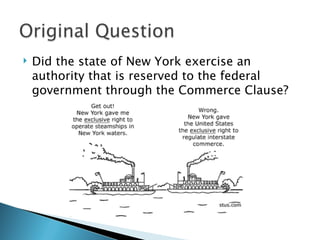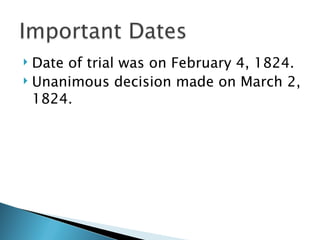Gibbons v ogden
- 2. In 1824, New York allowed Robert Fulton and Robert Livingston to have authority over the regulation of waterways between New York and New Jersey. The state of New York permitted Thomas Gibson to operate steamboat between these two states. Aaron Ogden believed that the decision was under the jurisdiction of the Federal government to grant Gibson permission to operate between different states.
- 3. The Commerce Clause was violated. Federal government has power to regulate any and all interstate activity under Commerce Clause and this is enforced through the Supremacy Clause.
- 4. Did the state of New York exercise an authority that is reserved to the federal government through the Commerce Clause?
- 5. Date of trial was on February 4, 1824. Unanimous decision made on March 2, 1824.
- 6. The Supreme Court ruled in favor of Ogden. The Commerce Clause was violated and the federal government reserves the power to regulate interstate activity. As a result of Supremacy Clause, Congress is given power over the several participating states.
- 7. Chief Justice Marshall gave an opinionated meaning to the Commerce Clause, concluding that navigation on interstate waterways could fall under the category of commerce. Any nature of interstate commerce fell under federal government jurisdiction. This case is an example of federalism where the federal government is given a power over the states.
- 8. http://www.oyez.org/cases/1792-1850/1824/18 http://cases.laws.com/gibbons-v-ogden







